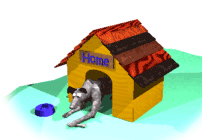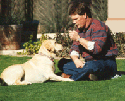 |
|||
|
|
 |
 |
|
|
 |
|||
|
"Bad" Genes Can Make Great Pets My dog , Megan, is a purebred Australian Cattle Dog . Twelve years ago she was taken to an animal shelter because her behavior was completely unacceptable. She was on "death row" for the heinous offense of chasing livestock - a task that she was genetically designed to do. In the world of canines, this scenario is common. Many dogs are unfairly classified as behavioral "misfits". Terriers that dig holes, Beagles that bay at the moon and retrievers that kill birds are good examples of dogs that are condemned for displaying perfectly normal, but often unacceptable, behavior. Ironically, most of these behaviors are both prized and despised by humans. The farm terrier that kills small animals is highly valued, while a city pooch that performs the same behavior may be branded "vicious". Beagles whose baying can be heard for miles earn praise for a hunter and a criminal citation for the urban pet owner. Though simple ignorance is usually blamed for this paradox, the facts do not support that assumption. A person who buys an Alaskan Malamute invariably brags about the fact that they are used as sled dogs. This claim is usually left unfinished as their dog drags them briskly down the street, like a sack of potatoes. The same owner who revels in the fact that their Pit Bull Terrier comes from a lineage of fighting dogs is apparently mystified when "Chopper" kills the neighbor's Shi Tzu. It is obvious that the owners are simultaneously proud and apologetic for the same behaviors. The real culprit in this cross-species dilemma is probably not ignorance, but fantasy. A common reason for picking a particular breed is not the reality of the animal's behavioral traits, but the image it will project to others. Books about various breeds and species of pets pander to this process. Giant breeds, such as the Neopolitan Mastiff are often described in terms such as, "powerful" and "fiercely loyal". Border Collies are reputed to be "intelligent" and "obedient". The animal is selected because of the slogans attached to it, not because of any actual knowledge of the breed. Most often, basing the selection of an animal based on reputation leads to problems. The regal looking Mastiff will grow to be a 170 pound, slobbering beast, who may casually eat the neighbor's cat and splatter long tendrils of drool on the walls. The Border Collie, without daily opportunities to chase sheep, may develop aberrant behaviors such as chasing shadows or nipping the heels of small children. Each animal will offer perfectly normal behavior that represents the reality behind its image. The unprepared owner will be frustrated and disappointed that the dog does no live up to unrealistic expectations. Selecting a dog based on real, rather than imagined, qualities is the first step toward building a successful relationship. If you are considering acquiring a dog, these suggestions may help you decide which kind to get. * Examine your lifestyle objectively before you decide to choose a pet. If you work 80 hours a week, a goldfish may be too much of a responsibility. Most dogs are dynamic creatures who need mental stimulation and physical activity. If you really want a behaviorally robust animal, such as a Doberman or an Irish Setter, you should consider waiting until you can devote more time to a pet. * Research the type of pet you want, before you buy or adopt. Do not automatically trust books or magazines that are written by enthusiasts. Even the most objective person may unintentionally exaggerate an animal's good points while minimizing the bad. * If there is a local club or organization for the type of animal that you want, see if you can attend a meeting or get to know some of the members. Seeing one perfectly behaved Tasmanian Devil does not give you enough knowledge to assume that all such creatures are well behaved. * See if you can actually borrow a similar pet from a breeder or friend. Many humane organizations and rescue clubs are looking for foster homes for pets. They may welcome an offer to have you temporarily care for a misplaced animal. Actually caring for an animal is the best way to know if you have made the right selection.
|
|||
|
Copyright 1994-2013 Gary Wilkes. All rights reserved.
|
|||

